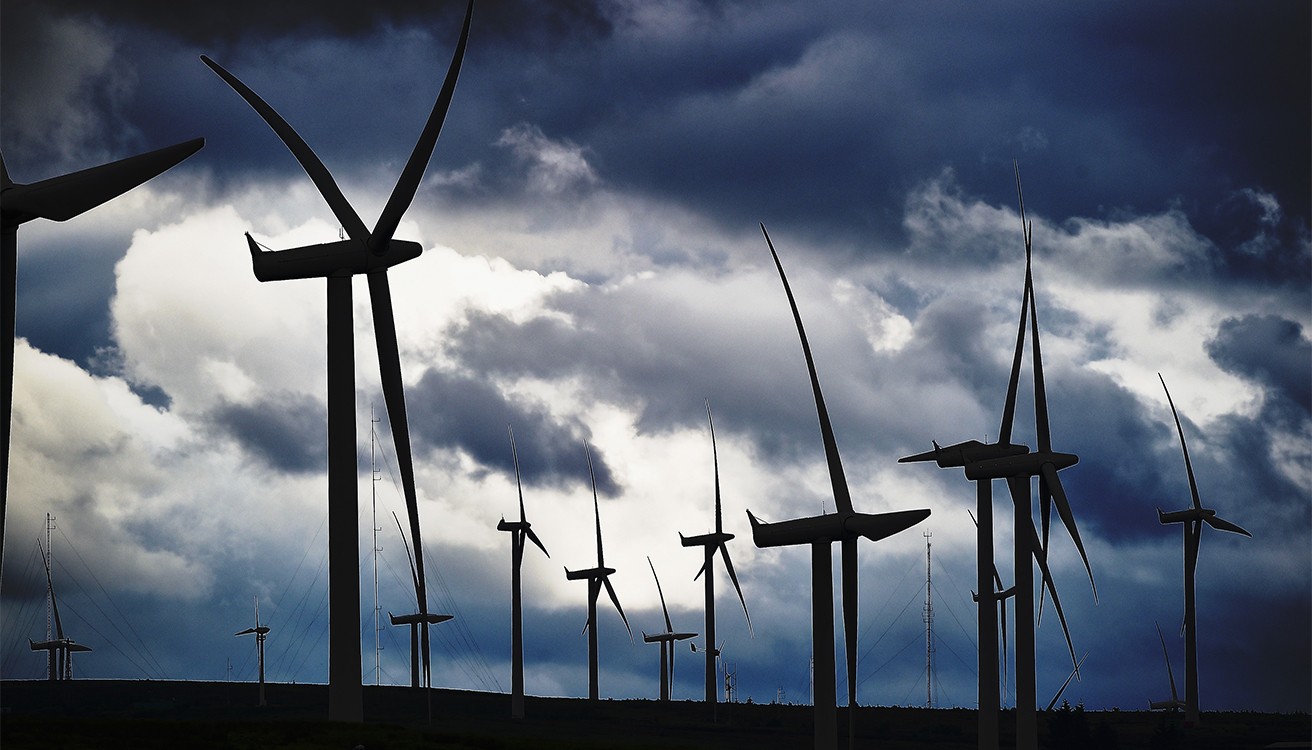The Conservatives and Labour are offering Britons contrasting policy agendas at tomorrow’s general election, and one area that epitomises that division is energy and climate change.
Although both parties want to reach net-zero carbon emissions, Conservative Prime Minister Boris Johnson says the free market is the solution, while Labour leader Jeremy Corbyn sees it as part of the problem. Labour’s plan to nationalise the energy industry would see the biggest shake-up of the sector in a generation.
Energy is integrally linked with environmental challenges and both leaders highlight climate issues in their manifesto introductions. But the two parties then diverge on the solutions later in the documents.
Labour puts green issues at the core of its manifesto with policies on energy, transport and the economy all seen through an environmental lens. The manifesto opens with policies aimed at creating a “Green Industrial Revolution” and “energy,” “climate” or “the environment” are mentioned an average of 1.5 times per page. The same terms are mentioned half as frequently in the Conservative manifesto and policies on tackling climate change do not appear until the final pages of the document.
Labour’s nationalisation plans
Labour’s proposed nationalisation of the energy and water industries would be a seismic change with massive impact throughout the value chain. Two justifications are put forward in the manifesto: that public ownership will lead to a fairer distribution of wealth and will ensure environmental concerns are put ahead of profit.
The proposals would see the national grid infrastructure is owned and maintained by a new UK National Energy Agency while 14 Regional Energy Agencies would replace existing district network operators. The new organisations would have statutory responsibility for decarbonising electricity.
The supply arms of the Big Six energy companies (British Gas, EDF Energy, E.On, npower, Scottish Power and SSE) would also be brought into public ownership, as would the water industry. The proposal is not costed, and there is no detail on timescales or how the policy would be implemented, including how shareholders would be compensated.
Labour’s proposed nationalisation of the energy and water industries would be a seismic change with massive impact throughout the value chain.
Conservatives will cap and cut bills
For the Conservatives, it is “free markets, innovation and prosperity” that can protect the planet. One policy with immediate profitability implications for the energy industry is the pledge to retain the existing energy tariff cap, limiting the amount suppliers can charge. There is no indication in the manifesto if, or when, the cap might be lifted (though Ofgem’s verdict on whether effective competition exists is expected in August 2020 and could influence subsequent policy).
The Tory manifesto also states it would introduce new measures to lower energy bills. It also promises enhanced powers for the Competition and Markets Authority “to tackle rip-offs and bad business practices” – though the two policies are not explicitly linked.
Net-zero goals
The Conservatives’ pledge to reach net-zero greenhouse gas and carbon emissions by 2050 is the most gradual of any of the leading political parties. They would invest in clean energy solutions and green infrastructure and “work with the market to deliver 2 million new high-quality jobs in clean growth”. A pledged £500m would be spent helping energy-intensive industries move to low-carbon techniques.
Labour’s “Green New Deal” aims to achieve the “substantial majority” of emissions reductions by 2030 but does not set a deadline for reaching net-zero. Instead, it sets net-zero targets for different sectors such as transport, food production and the NHS. A Climate and Environment Emergency Bill would set “robust, binding new standards” for decarbonisation, nature recovery and environmental quality.
Labour would create a £400bn National Transformation Fund, with £250bn of this to directly fund the transition to net-zero through a Green Transformation Fund. A commitment to create “a million climate jobs” encompasses plans for housing, green energy and electric vehicles as well as tree planting, flood defences and recycling.
Liberal Democrat plans for a 10-year emergency programme to cut greenhouse gas emissions substantially, and reach net zero by 2045 at the latest, would not put them significantly at odds with Labour in the event of a coalition.
Conservatives would spend £500m helping energy-intensive industries move to low-carbon techniques.
Renewables and nuclear
Expansion of renewable capacities is essential to the energy plans in both manifestos. The Conservative goal is for offshore wind capacity is to reach 40 gigawatts (GW) by 2030, up from current levels of 8.5GW. Floating wind farms, with turbines tethered in deep water, would be built and £800m would fund the first fully deployed carbon capture storage facility by mid-2020.
Labour aims to deliver nearly 90% of electricity and 50% of heat from renewable and low-carbon sources by 2030. The goal is for a net-zero carbon energy system “within the 2030s” with extensive investment in on- and offshore wind turbines and solar farms.
Nuclear is part of the energy plans of both, with the Conservatives supporting the sector, including fusion. Labour sees it as helping provide “energy security."
Continues below ...

In 2019, UK wind farms generated 20% of total electricity for the nation. In both the main parties' manifestos, expansion and building on the UK's renewable capacities is essential.
North Sea oil and gas
There is an implicit acceptance across all the manifestos that meeting net-zero goals means a move away from oil and gas. The Conservative manifesto takes a relatively upbeat approach, stating that the North Sea oil and gas industry has “a long future ahead” and a pivotal role to play as the UK moves to a net-zero economy. It proposes an “oil and gas sector deal” to support the transition away from fossil fuels.
Labour would provide a strategy to safeguard the people, jobs and skills that currently depend on the offshore oil and gas industry. They would support energy workers through the transition away from fossil fuels and guarantee them retraining and a new, unionised job on equivalent terms and conditions. Neither manifesto contains timescales or costs.
Climate change and financial regulation
Labour’s integration of environmental regulation throughout its policies is also evident in its attitude towards finance. Financial authorities would be able to encourage green investment and given more power to manage “the risk to financial stability posed by short-sighted investment in polluting assets”. Labour would change the criteria a company must meet to be listed on the London Stock Exchange so that any company that “fails to contribute to tackling the climate and environmental emergency” is delisted. They would also introduce a windfall tax on oil companies, stating that: “the companies that knowingly damaged our climate will help cover the costs”.
The Conservative manifesto has no mention of financial regulation concerning climate change but does propose a continuation of the Red Tape Challenge that targets “unnecessary regulations” to ensure rules are “sensible and proportionate”.
Labour would also introduce a windfall tax on oil companies, stating that: “the companies that knowingly damaged our climate will help cover the costs”.
Both manifestos also include plans to boost public transport, increase the use of electric vehicles and improve the energy efficiency of new and existing housing. Such programs will all have an impact on the energy industry – but nothing compared to the Labour’s proposed nationalisation.
With such contrasting policy agendas from the two main parties, don’t expect energy investors and executives to have an early night tomorrow.
Energy policies from the smaller parties
- Liberal Democrats aim to reach net-zero by 2045 with 80% of electricity to come from renewables by 2030. They propose £130bn infrastructure investment, including upgrading energy systems
- The Green Party would introduce a Carbon Tax that would increase over a decade “rendering coal, oil and gas financially unviable"
- The Brexit Party proposes zero VAT on domestic fuel
- The Scottish National Party is calling for the ring-fencing of oil and gas receipts, creating a Net Zero Fund, to help pay for the transition to renewables
- Plaid Cymru wants Wales to be 100% self-sufficient in energy by 2030. Plans include three tidal lagoons, a wind farm and a barrage
You may also be interested in:
Please note: This page is provided for information purposes only and should not be construed as an offer, or a solicitation of an offer, to buy or sell financial instruments. This page does not constitute a personal recommendation and is not investment advice. Any predictions, or forecasts expressed are based on significant judgement and analysis of available information at the time of writing and actual outcomes may be materially different and may be affected by political, economic or any other relevant circumstance changes.




